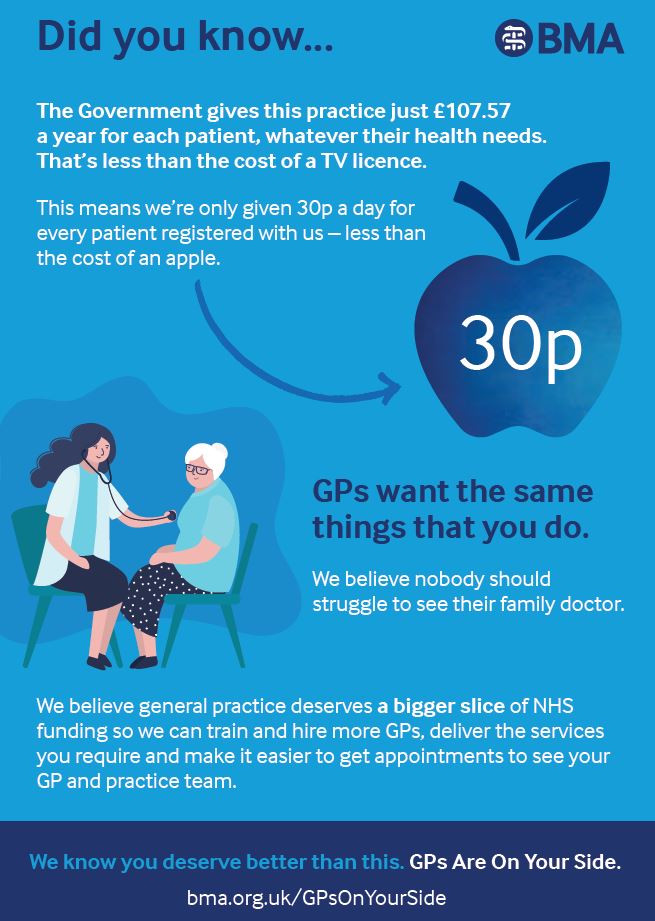GPs Industrial Action – How it could affect you.
General Practice is collapsing. Every practice across England is struggling to keep its doors open.
We value our patients. We know that most patients value us too, especially when they need us regularly. You know we can deal with most of your health problems, keep you out of hospital, and have your best interests at heart. The problem is with the mismanagement of the NHS.
Your GP is an expert in general medical practice – trained over 10 years to deal with complex problems, spot serious symptoms, and decide when you need specialist help at the hospital.

But did you know that your practice receives just £107.57 per year for each patient, whatever their health needs. That’s less than the cost of an annual TV licence.
It’s just 30p a day for every patient registered with us – less than the cost of an apple.
We believe general practice deserves a bigger slice of NHS funding so we can train and hire more GPs, deliver the services you require and make it easier for you and your loved ones to get appointments to see your GP and practice team.
GPs want the same things that you do. We believe nobody should struggle to see their family doctor.
General Practice should be as it once was – a familiar family doctor, offering continuity of care in a surgery full of friendly familiar faces within a safe building where you knew you would get the care you needed, for everyone wherever you are in the country.
How can you support your family doctor?
When candidates from the political parties come knocking on your door, ask them what they will do to save general practice. What will they do so you can see a GP in a modern local surgery? You can also write to your MP.
As part of the action, the BMA will encourage surgeries to choose from a list of 10 actions, with practices able to choose how many they implement.
The 10 options GPs have at their disposal include:
- Limit the daily patient contacts to a maximum of 25 people per clinician and divert patients to urgent care once that limit has been reached.
- Stop engaging with e-Referral advice and guidance pathways unless in the patient’s best interests.
- Serve notice on any voluntary services that plug local gaps.
- End the rationing of referrals, investigations and admissions.
- Switch off the software that allows third party entry into GP clinical records.
- Withdraw permission for data sharing agreements that use data for secondary purposes beyond care.
- Freeze the sign up of any new data sharing agreements.
- Switch off NHS software embedded by the local Integrated Care Board which tries to cut costs and/or rationing.
- Refuse to share data from phone calls and keep online triage tools switched off during core practice opening hours.
- Defer making any decision to accept local or national NHS England pilot programmes.
‘An act of desperation’
The BMA said action by GPs in England will be a “slow burn” rather than a “big bang” and it came in response to a new contract, which will see services given a 1.9% funding increase for 2024/25. This, they claim, means many surgeries will struggle to stay financially viable. The BMA described the vote for collective action by GPs as “an act of desperation”.
At 306 Medical Centre we are finalising the best course of action, we would like to assure you essential patient care will not be affected. However we will be limiting daily contacts to a maximum of 25 patients per clinician and during this time any optional services that we are not formally contracted to undertake, will not be provided. We recommend that you should use 111 for urgent medical help when GP appointments are unavailable and if it is a serious or life-threatening emergency to call 999.
We thank you in advance for your support during this time. This is an act of desperation and not choice and we have taken this action with our patients in mind, to ensure that going forward we can continue to provide a sustainable and effective GP service.
English GPs to stage industrial action over 1.9% budget increase
(Excerpt Courtesy of the Guardian – Andrew Gregory Thu 1 Aug 2024 10.48 BST)
GPs in England are to stage industrial action for the first time in 60 years amid a row over funding, a move that experts have warned could have a catastrophic effect on the entire healthcare system.
In a ballot run by the British Medical Association (BMA), family doctors voted overwhelmingly in favour of taking collective action in protest at the previous government increasing their budget by only 1.9% this year. More than 8,500 GPs took part in a vote, the BMA said, with 98.3% backing collective action. The disruption is likely to begin immediately and could last months.
Practices will choose what form of industrial action to take from a selection of 10 measures set out by the BMA, the Guardian understands, and could bring the NHS to a standstill.
One option is to limit the number of patients GPs will see each day to 25. They may choose to stop performing work they are not formally contracted to undertake, and could ignore “rationing” restrictions by “prescribing whatever is in the patient’s best interest”.
The last time GPs took “collective action” was in 1964, when family doctors collectively handed in undated resignations to the Wilson government. This led to changes, including the Family Doctor Charter of 1965.
The BMA said the new GP contract, which will increase funding for services by 1.9% in 2024-25, means many surgeries will struggle to stay financially viable.
Dr Katie Bramall-Stainer, the chair of the BMA’s GP committee, said: “We had a huge response to this ballot, and the results are clear – GPs are at the end of their tether. This is an act of desperation. For too long, we’ve been unable to provide the care we want to. “We are witnessing general practice being broken. The era of the family doctor has been wiped out by recent consecutive governments and our patients are suffering as a result.” Bramall-Stainer said the action would be a “slow burn” rather than a “big bang”.
NHS leaders warned that wider NHS services would experience knock-on effects. Saffron Cordery, the deputy chief executive of NHS Providers, said: “Relentless pressure on primary care, plus many practices closing across England, means patients are turning to already busy accident and emergency (A&E) departments to seek help.
The Royal College of GPs said the ballot result showed the “strength of feeling” among family doctors in England. Its chair, Prof Kamila Hawthorne, said: “No GP will want to restrict the services they provide for their patients – and it needs to be made clear that GPs and their teams will still be working.
“But there are many aspects of what GPs provide that go well beyond the contractual requirements they are under, and this additional workload and the goodwill of the GPs delivering it, have been taken for granted for too long.”
Within minutes of the ballot result being announced, NHS England urged the public to continue to come forward for care as normal.
Practices will still be required to open between 8am to 6.30pm Monday to Friday. Dr Amanda Doyle, the NHS national director for primary care and community services, vowed to work with ministers to find a resolution to end the industrial action. “Our message to the public remains the same – they should continue to come forward for care during this collective action, as GP practices will remain open,” she added.
The NHS recommends patients should use 111 for urgent medical help when their GP practice is unavailable and if it is a serious or life-threatening emergency to call 999.
The ballot result came hours after ministers announced plans to cut red tape to enable GP surgeries in England to hire more doctors.
Officials said the move was an “emergency measure” while the government “works with the profession to identify longer-term solutions to GP unemployment and general practice sustainability”.

